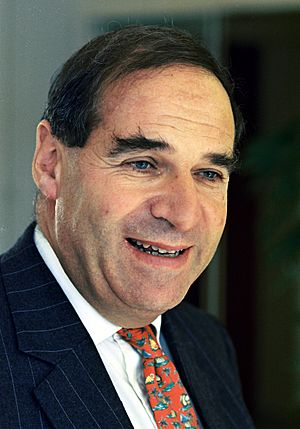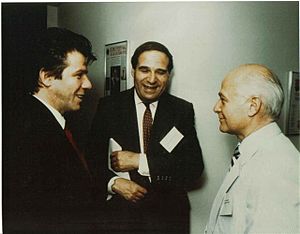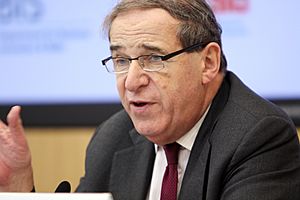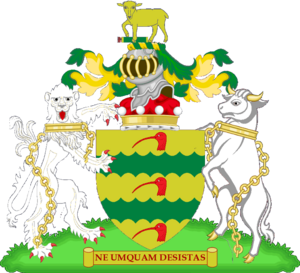Leon Brittan facts for kids
Quick facts for kids
The Lord Brittan of Spennithorne
|
|||||||||||||||||||||||||||||||||||
|---|---|---|---|---|---|---|---|---|---|---|---|---|---|---|---|---|---|---|---|---|---|---|---|---|---|---|---|---|---|---|---|---|---|---|---|

Brittan in 1996
|
|||||||||||||||||||||||||||||||||||
| Vice-President of the European Commission | |||||||||||||||||||||||||||||||||||
| In office 16 March 1999 – 15 September 1999 |
|||||||||||||||||||||||||||||||||||
| President | Manuel Marín (acting) | ||||||||||||||||||||||||||||||||||
| Preceded by | Manuel Marín | ||||||||||||||||||||||||||||||||||
| Succeeded by | Neil Kinnock | ||||||||||||||||||||||||||||||||||
|
|||||||||||||||||||||||||||||||||||
| Secretary of State for Trade and Industry | |||||||||||||||||||||||||||||||||||
| In office 2 September 1985 – 24 January 1986 |
|||||||||||||||||||||||||||||||||||
| Prime Minister | Margaret Thatcher | ||||||||||||||||||||||||||||||||||
| Preceded by | Norman Tebbit | ||||||||||||||||||||||||||||||||||
| Succeeded by | Paul Channon | ||||||||||||||||||||||||||||||||||
| Secretary of State for the Home Department | |||||||||||||||||||||||||||||||||||
| In office 11 June 1983 – 2 September 1985 |
|||||||||||||||||||||||||||||||||||
| Prime Minister | Margaret Thatcher | ||||||||||||||||||||||||||||||||||
| Preceded by | William Whitelaw | ||||||||||||||||||||||||||||||||||
| Succeeded by | Douglas Hurd | ||||||||||||||||||||||||||||||||||
| Chief Secretary to the Treasury | |||||||||||||||||||||||||||||||||||
| In office 5 January 1981 – 11 June 1983 |
|||||||||||||||||||||||||||||||||||
| Prime Minister | Margaret Thatcher | ||||||||||||||||||||||||||||||||||
| Preceded by | John Biffen | ||||||||||||||||||||||||||||||||||
| Succeeded by | Peter Rees | ||||||||||||||||||||||||||||||||||
| Minister of State for Home Affairs | |||||||||||||||||||||||||||||||||||
| In office 4 May 1979 – 5 January 1981 |
|||||||||||||||||||||||||||||||||||
| Prime Minister | Margaret Thatcher | ||||||||||||||||||||||||||||||||||
| Preceded by | The Lord Boston of Faversham | ||||||||||||||||||||||||||||||||||
| Succeeded by | Patrick Mayhew | ||||||||||||||||||||||||||||||||||
| Member of Parliament for Richmond (Yorks) |
|||||||||||||||||||||||||||||||||||
| In office 9 June 1983 – 31 December 1988 |
|||||||||||||||||||||||||||||||||||
| Preceded by | Timothy Kitson | ||||||||||||||||||||||||||||||||||
| Succeeded by | William Hague | ||||||||||||||||||||||||||||||||||
| Member of Parliament for Cleveland and Whitby |
|||||||||||||||||||||||||||||||||||
| In office 28 February 1974 – 13 May 1983 |
|||||||||||||||||||||||||||||||||||
| Preceded by | James Tinn | ||||||||||||||||||||||||||||||||||
| Succeeded by | Constituency abolished | ||||||||||||||||||||||||||||||||||
| Personal details | |||||||||||||||||||||||||||||||||||
| Born |
Leon Brittan
25 September 1939 London, England |
||||||||||||||||||||||||||||||||||
| Died | 21 January 2015 (aged 75) London, England |
||||||||||||||||||||||||||||||||||
| Political party | Conservative | ||||||||||||||||||||||||||||||||||
| Spouse |
Diana Peterson
(m. 1980) |
||||||||||||||||||||||||||||||||||
| Children | 2 | ||||||||||||||||||||||||||||||||||
| Relatives | Samuel Brittan (brother) | ||||||||||||||||||||||||||||||||||
| Education | Haberdashers' Aske's Boys' School | ||||||||||||||||||||||||||||||||||
| Alma mater | |||||||||||||||||||||||||||||||||||
| Profession | Barrister | ||||||||||||||||||||||||||||||||||
| Awards | Knight Bachelor (1989) | ||||||||||||||||||||||||||||||||||
Leon Brittan, Baron Brittan of Spennithorne, PC, QC, DL (25 September 1939 – 21 January 2015) was a British Conservative politician and barrister who served as a European Commissioner from 1989 to 1999. As a member of Parliament from 1974 to 1988, he served several ministerial roles in Margaret Thatcher's government, including Home Secretary from 1983 to 1985.
Contents
Early life
Leon Brittan was born in London, the son of Rebecca (née Lipetz) and Joseph Brittan, a doctor. His parents were Lithuanian Jews who had migrated to Britain before the Second World War.
He was educated at the Haberdashers' Aske's Boys' School and Trinity College, Cambridge, where he was President of the Cambridge Union Society and Chairman of the Cambridge University Conservative Association. Brittan then studied at Yale University on a Henry Fellowship. Sir Samuel Brittan, the economics journalist, was his brother. The former Conservative MP Malcolm Rifkind, and the music producer Mark Ronson, were cousins.
Political career
MP and minister
After unsuccessfully contesting the constituency of Kensington North in 1966 and 1970, he was elected to parliament in the general election of February 1974 for Cleveland and Whitby, and became an opposition spokesman in 1976. He was made a Queen's Counsel in 1978. Between 1979 and 1981 he was Minister of State at the Home Office, and was then promoted to become Chief Secretary to the Treasury, becoming the youngest member of the Cabinet. He warned cabinet colleagues that spending on social security, health and education would have to be cut "whether they like it or not".
At the 1983 election Brittan was elected MP for Richmond. Following the election, he was promoted to Home Secretary, becoming the youngest since Churchill. During the 1984–85 miners' strike, Brittan was a strong critic of the leadership of the National Union of Mineworkers. He accused them of organising violence by flying pickets, whom he described as "thugs". One factor in the defeat of the strike was central control of local police forces. As soon as the strike began, Brittan set up a National Reporting Centre in New Scotland Yard to co-ordinate intelligence and the supply of police officers between forces as necessary. Margaret Thatcher's government had carefully planned for a miners' strike and a Whitehall committee had been meeting in secret since 1981, to prepare for a long dispute.
In 1984, after the murder of British police officer Yvonne Fletcher during a protest outside the Libyan embassy in London, Brittan headed the government's crisis committee as both Thatcher and the Foreign Secretary, Sir Geoffrey Howe, were away at the time. In January 2014, secret government documents released by the National Archives disclosed that British officials were twice warned by Libya that the Libyan embassy protest would become violent – hours before WPC Fletcher was killed.
In September 1986, Brittan was cleared by a High Court Judge of acting unlawfully when, as Home Secretary, he gave MI5 permission to tap the telephone of a leader of the Campaign for Nuclear Disarmament.
In September 1985, Brittan was moved to Secretary of State for Trade and Industry. The reason for his demotion, according to Jonathan Aitken, was that the prime minister Margaret Thatcher felt that Brittan was "not getting the message across on television". In her memoirs, Thatcher wrote of Brittan: "Everybody complained about his manner on television, which seemed aloof and uncomfortable."
Brittan had been criticised as a poor communicator and for his role in the suppression of a BBC television programme in the Real Lives series on The Troubles in Northern Ireland, At the Edge of the Union. Brittan stated that transmission of the programme would be against the national interest and in August 1985 he wrote to the BBC chairman, Stuart Young, asking for the broadcast to be cancelled. The BBC's Board of Governors called an emergency meeting and ruled that the documentary could not be shown. The controversy led to a rift in the BBC between the boards of Management and Governors. It also led to a day of strike action by hundreds of television and radio workers who protested against what they perceived as government censorship.
Resignation over the Westland affair
Brittan resigned as Trade and Industry Secretary in January 1986, over the Westland affair. Brittan had authorised the leaking of a letter from the Solicitor General that had accused Michael Heseltine of inaccuracies in his campaign for Westland to be rescued by a consortium of European investors. The rest of the Government, led by Margaret Thatcher, supported a deal with the American business Sikorsky Fiat.
Jonathan Aitken wrote of Brittan's resignation: "Soon after a poisonous meeting of Tory backbenchers at the 1922 Committee he fell on his sword. It was a combination of a witch hunt and a search for a scapegoat – tainted by an undercurrent of anti-Semitism. […] I believed what should have been obvious to anyone else, that he was being used as a lightning conductor to deflect the fire that the Prime Minister had started and inflamed". It was later revealed that Brittan had attempted to persuade British Aerospace and General Electric Company (GEC) to withdraw from the European consortium.
In October 1986, in a House of Commons debate, Brittan made a bitter attack on Michael Heseltine, accusing him of "thwarting the Government at every turn" in its handling of the Westland affair. Brittan said that Government decisions "should have the support of all its members and should not be undermined from within".
In 1989, Brittan revealed in a Channel 4 programme that two senior Downing Street officials, Bernard Ingham and Charles Powell, had approved the leaking of the letter from the Solicitor General. Brittan's claim led to calls from some Labour MPs for there to be a new inquiry into the Westland affair.
European Commission
Brittan was knighted in the 1989 New Years Honours List. He was made European Commissioner for Competition at the European Commission early in 1989, resigning as an MP to take the position. He accepted the post as European commissioner reluctantly, as it meant giving up his British parliamentary ambitions. Margaret Thatcher appointed Brittan to the Commission as a replacement for Lord Cockfield, whose pro-European enthusiasm she disapproved of; however, in doing so she had overlooked Brittan's own record as a supporter of the European Union and subsequently found his views and policies at odds with those she had expected from him. Brittan passed the merger regulation in 1989, which enabled him to ban the ATR/De Havilland planned merger in 1991.
In 1993 he became European Commissioner for Trade and in 1995 European Commissioner for External Affairs, also serving as a Vice-President of the European Commission. Brittan resigned with the rest of the Santer Commission in 1999 amid accusations of fraud against Jacques Santer and Édith Cresson. During his time as a Vice-President of the European Commission, one subsequently prominent member of his official office was Nick Clegg, who became leader of the Liberal Democrats in December 2007 and deputy prime minister in May 2010.
Peerage
Brittan was created a life peer (Baron Brittan of Spennithorne, of Spennithorne in the County of North Yorkshire) on 9 February 2000. He was vice-chairman of UBS AG Investment Bank, non-executive director of Unilever and member of the international advisory committee for Total. In August 2010, Brittan was appointed as a trade adviser to the UK government. Prime Minister David Cameron said that Brittan had "unrivalled experience" for the job, which was scheduled to last for six months.
Brittan's wife Diana (née Clemetson, born 1940), Lady Brittan of Spennithorne, was named a Dame Commander of the Order of the British Empire (DBE) in the 2004 Birthday Honours "for public service and charity".
Death
Brittan died at his home in London on 21 January 2015, at the age of 75; he had been ill with cancer for some time. He had two stepdaughters.
Honours
Brittan was created a life peer by the Queen on the advice of Conservative Party leader William Hague. He took the title Baron Brittan of Spennithorne, of Spennithorne in the County of North Yorkshire on 9 February 2000. He sat with the Conservative Party benches in the House of Lords.
Commonwealth honours
| Country | Date | Appointment | Post-nominal letters |
|---|---|---|---|
| 1978 – 21 January 2015 | Queen's Counsel | QC | |
| 1981 – 21 January 2015 | Member of Her Majesty's Most Honourable Privy Council | PC | |
| 31 December 1988 – 21 January 2015 | Knight Bachelor | Kt | |
| 1 August 2001 – 25 September 2014 | Deputy Lieutenant of North Yorkshire | DL |
Foreign honours
| Country | Date | Appointment | Post-nominal letters |
|---|---|---|---|
| Order of the Cross of Terra Mariana (2nd Class) |
Scholastic
| Location | Date | School | Position |
|---|---|---|---|
| 1993–2005 | Teesside University | Chancellor |
| Location | Date | School | Degree | Gave Commencement Address |
|---|---|---|---|---|
| 1990 | Newcastle University | Doctor of Civil Law (DCL) | ||
| 1990 | University of Hull | Doctor of Laws (LL.D) | ||
| 1991 | University of Edinburgh | Doctorate | ||
| 1992 | University of Bradford | Doctor of Laws (LL.D) | ||
| 1992 | University of Durham | Doctor of Civil Law (DCL) | ||
| 1995 | University of Bath | Doctor of Laws (LL.D) | ||
| Teesside University | Doctor of Laws (LL.D) |
Memberships and fellowships
| Country | Date | Organisation | Position |
|---|---|---|---|
| 1960 | Cambridge Union | President | |
| 1983 – 21 January 2015 | Inner Temple | Bencher |
Arms
See also
 In Spanish: Leon Brittan para niños
In Spanish: Leon Brittan para niños




